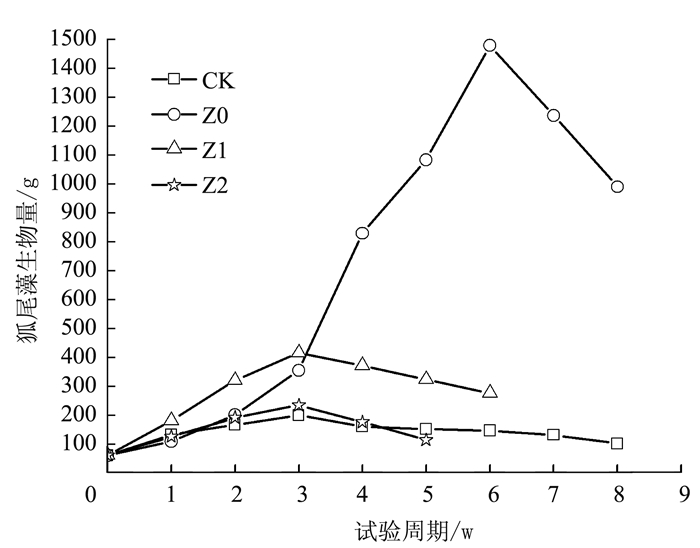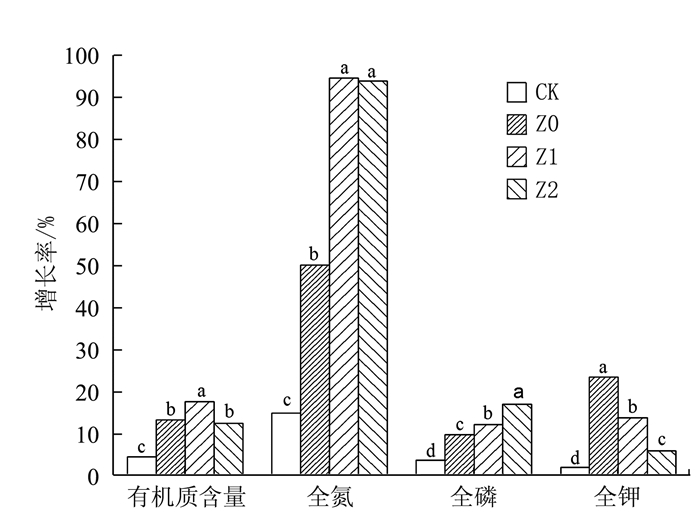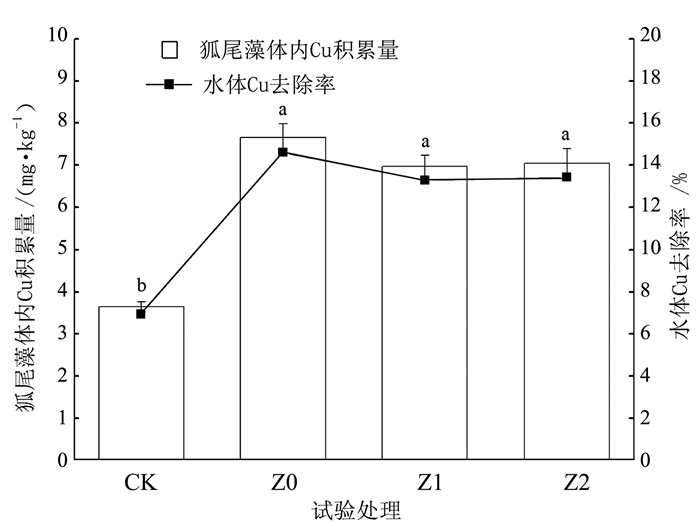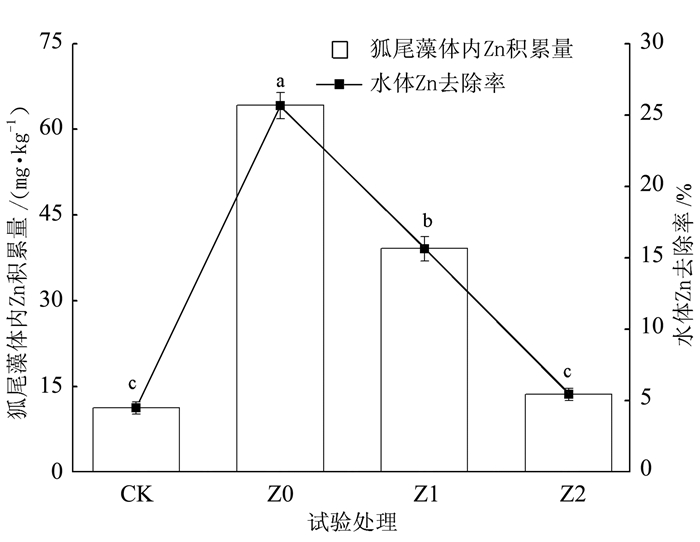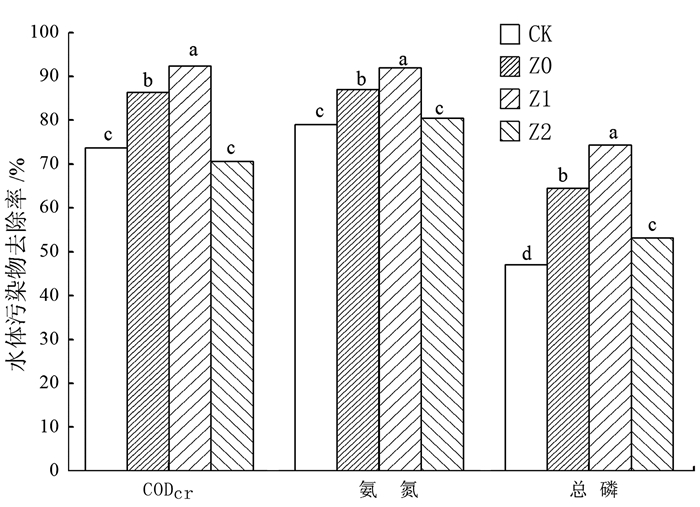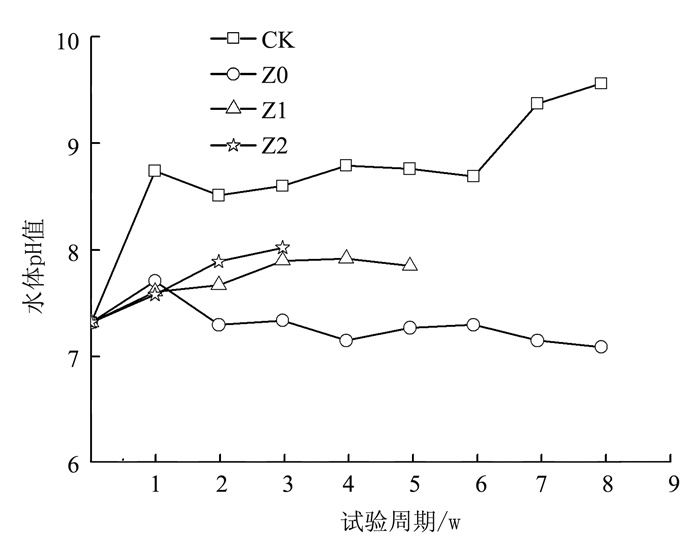Cu and Zn Accumulations in Myriophyllum spicatum for Purification of Pig Farm Biogas Slurry
-
摘要: 采用室外水培试验,研究在不同水力停留时间(20、40、60d),狐尾藻对生猪养殖场沼液Cu、Zn的富集能力。结果表明:当水力停留时间为60 d时,狐尾藻生物量最大,可达1 475.00 g,是对照组的7.40倍,其对沼液Cu、Zn的积累量也最大,分别为7.66 mg·kg-1和64.18 mg·kg-1,且狐尾藻对Zn的富集能力大于Cu;当水力停留时间为40 d时,狐尾藻对沼液的净化效果最好,CODCr、氨氮和总磷去除率分别可达92.40%、92.03%、74.39%。试验结束后,狐尾藻体内有机质、氮、磷、钾含量,相比对照组分别提高7.62%~12.57%、30.62%~69.38%、5.88%~12.94%和3.85%~21.15%;狐尾藻体内Cu、Zn含量分别为:6.76~10.78、77.63~130.60 mg·kg-1,符合GB26419-2010及我国农业行业标准NY929-2005。因此狐尾藻富集沼液Cu、Zn收割后可以作为青饲料加以利用,净化沼液同时避免二次污染。Abstract: The ability of Myriophyllum spicatum to absorb and accumulate Cu and Zn from pig farm biogas slurry was studied. Hydraulic residence time (HRT) of 20, 40 and 60 d were applied for the plants in the study. It was found that the maximum biomass of the plants in 40 d of HRT reached 1 475.00 g, which was 7.40 times higher than that of control. More importantly, the Cu and Zn accumulations in the plants were 7.66 mg·kg-1 and 64.18 mg·kg-1, respectively, which were significantly greater than those in control. The metal removal from the slurry by the plants was at the highest levels when 40 d HRT was applied as well. The reductions on COD, ammonia nitrogen and total phosphorus on the slurry were 92.40%, 92.03% and 74.39%, respectively. After the HRT test the plants had increases of 7.62%-12.57% on organic matters, 30.62%-69.38% on N, 5.88%-12.94% on P, and 3.85%-21.15% on K, as well as contents of 6.76-10.78 mg·kg-1 of Cu and 77.63-130.60 mg·kg-1 of Zn. The increases of metal contents met the levels set forth by the national GB26419-2010 and the Agricultural Industry Standard of NY929-2005. Furthermore, the harvested M. spicatum could be used for fodder to effectively avoid the concern of secondary pollution after the biogas slurry purification.
-
Keywords:
- Myriophyllum spicatum /
- accumulation /
- biogas slurry /
- Cu /
- Zn
-
0. 引言
【研究意义】国兰(Chinese Cymbidium)是中国传统兰花的统称,为兰科(Orchidaceae)兰属(Cymbidium)植物,包括春兰(C. goeringii)、蕙兰(C. faberi)、建兰(C. ensifolium)、墨兰(C. sinense)、寒兰(C.kanran)等,其味幽香,花色素雅,花姿优美,观赏和经济价值极高[1]。目前,种质资源缺乏是影响中国兰产业发展的重要因素之一[2],而兰科植物杂交范围很宽,种、属间均可杂交,且存在较大变异性,中间类型多,种的界限不清晰,加大了兰科植物研究的难度[3]。因此,通过分子生物学手段,开展稳定可靠的品种鉴定技术及分类学研究是非常必要的。【前人研究进展】由于分子标记与传统应用的常规遗传标记相比具有诸多优点,目前RAPD、AFLP、ISSR、SRAP等标记在兰花遗传育种中已得到广泛应用。江亚雯等[4]采用ISSR分子标记对江西省主要山脉12个野生寒兰居群进行遗传多样性和群体遗传结构研究;王晓英等[5]采用AFLP技术对51个春兰品种进行了遗传多样性分析;胡薇等[6]利用RAPD标记分析了38个建兰品种的遗传多样性和亲缘关系。EST-SSR是近年发展起来的基于EST数据库开发的新型分子标记,在资源鉴定、遗传作图、遗传多样性、基因发掘等研究中开发潜力巨大[7],但有关EST-SSR标记在国兰中的研究报道还较少见。【本研究切入点】由于EST-SSR标记来自于相对保守的转录组数据,故在物种间有较好的通用性[8-11],杂交兰是由国兰和大花蕙兰杂交选育成的兰花新品种,从杂交兰的EST-SSR中寻找适用于国兰的分子标记引物,不仅可以减少国兰引物的合成成本,丰富分子标记数量,也提高了杂交兰EST-SSR标记的利用价值。【拟解决的关键问题】本研究以44份国兰品种为材料,从杂交兰EST-SSR引物中筛选出适用于国兰的候选引物,为国兰寻找新的分子标记,并用这些新标记分析国兰的种间遗传多样性,以期为国兰种质鉴定、遗传多样性分析、分子标记辅助育种及种质资源合理利用等提供更丰富的标记资源。
1. 材料与方法
1.1 试验材料
供试材料为包括建兰、春兰、墨兰在内的44份国兰品种(表1),上述材料均取自福建省农业科学院作物研究所花卉种质资源圃,分别取其新鲜叶片,保存于−80℃条件下备用。
表 1 国兰供试材料信息Table 1. Information on Chinese cymbidiumcultivars 编号
No.品种名
Variety name种类
Species1 锦旗 Jinqi 建兰 C. ensifolium 2 四季玉妃 Sijiyufei 建兰 C. ensifolium 3 四季虎斑 Sijihuban 建兰 C. ensifolium 4 宝岛仙女 Baodaoxiannv 建兰 C. ensifolium 5 市长红 Shizhanghong 建兰 C. ensifolium 6 素君荷 Sujunhe 建兰 C. ensifolium 7 新品荷 Xinpinhe 建兰 C. ensifolium 8 红荷冠 Hongheguan 建兰 C. ensifolium 9 花叶建兰 Huayejianlan 建兰 C. ensifolium 10 春剑大富贵 Chunjiandafugui 春剑 C. longibractium 11 红荷梅 Honghemei 春兰 C. goeringii 12 红荷 Honghe 春兰 C. goeringii 13 碧龙玉素 Bilongyusu 莲瓣兰 C. lianpan 14 碧玉奇素 Biyuqisu 莲瓣兰 C. lianpan 15 晃辉 Huanghui 建兰 C. ensifolium 16 大唐盛世 Datangshengshi 春兰 C. goeringii×莲瓣兰 C. lianpan 17 瑞梅 Ruimei 春兰 C. goeringii 18 高山春色 Gaoshanchunse 建兰 C. ensifolium 19 国色天香 Guosetianxiang 建兰 C. ensifolium 20 铁骨素梅 Tiegusumei 建兰 C. ensifolium 21 铁金刚 Tiejingang 建兰 C. ensifolium 22 马耳 Maer 建兰 C. ensifolium 23 红梅 Hongmei 建兰 C. ensifolium 24 素心爪 Suxinzhua 建兰 C. ensifolium 25 地荷 Dihe 建兰 C. ensifolium 26 金丝马尾爪 Jinsimaweizhua 建兰 C. ensifolium 27 金针 Jinzhen 建兰 C. ensifolium 28 桃娇 Taojiao 建兰 C. ensifolium 29 小桃红 Xiaotaohong 建兰 C. ensifolium 30 萨摩锦 Samojin 建兰 C. ensifolium 31 青山玉泉 Qingshanyuquan 建兰 c. ensifolium 32 凤 Feng 建兰 c. ensifolium 33 丹霞建 Danxiajian 建兰 C. ensifolium 34 大凤素 Dafengsu 建兰 C. ensifolium 35 达摩爪 Damozhua 墨兰 C. sinense 36 龙梅 Longmei 墨兰 C. sinense 37 四季达摩 Sijidamo 墨兰 C. sinense 38 红宝石 Hongbaoshi 墨兰 C. sinense 39 玉兰蔻 Yulankou 墨兰 C. sinense 40 贵夫人 Guifuren 墨兰 C. sinense 41 黄荷梅 Huanghemei 春兰 C. goeringii 42 金边报岁兰 Jinbianbaosuilan 墨兰 C. sinense 43 银托 Yintuo 墨兰 C. sinense 44 企黑 Qihei 墨兰 C. sinense 1.2 DNA提取及EST-SSR-PCR扩增
采用改良CTAB法进行国兰叶片总DNA的提取,获得的总DNA经1%琼脂糖凝胶电泳检测其完整性,并利用分光光度计法检测其浓度,稀释至统一浓度后,将产物置于−20℃条件下保存备用。基于本课题组杂交兰转录组测序获得的EST-SSR标记引物,随机选取240对引物用于国兰PCR扩增。PCR反应体系为25 μL,包括模板DNA(100 ng·μL−1)1.0 μL,上、下游引物(10 μmol·L−1)各1.0 μL,10×Buffer(含Mg2+)2.5 μL,dNTPs(2.5 mmol·L−1)2.0 μL,Taq聚合酶(5 U·μL−1)0.25 μL,ddH2O 17.25 μL。PCR扩增程序为:94℃预变性4 min;94℃变性30 s,48~54℃退火30 s,72℃延伸45 s,共35个循环;72℃延伸10 min,4℃保存。PCR扩增产物先采用1.5%琼脂糖凝胶电泳检测,舍去无条带或是效果不理想的引物,将条带清晰、有目标片段的产物利用12%聚丙烯酰胺凝胶电泳进行分离。
1.3 数据分析
统计并记录电泳图谱中每一样品扩增所产生的DNA条带数,计算总条带数、多态性条带数、各引物的多态性比率和多态性信息量(PIC)及条带大小等。对记录的DNA条带构建原始数据矩阵,将相同位置上清晰出现的条带记为1,同一位置无条带或是弱带的则记为0。利用NTSYS-pc 2.10e软件进行聚类分析,并绘制供试国兰种质资源聚类图。
2. 结果与分析
2.1 杂交兰EST-SSR标记在国兰上的通用性
随机选择供试材料中的1份春兰、1份建兰、1份墨兰材料进行240对EST-SSR引物的PCR扩增。结果表明,163对引物在春兰中能扩增出稳定清晰的带型(有效扩增率67.92%),159对引物在建兰中能扩增出稳定清晰的带型(有效扩增率66.25%),171对引物在墨兰中能扩增出稳定清晰的带型(有效扩增率71.25%)。
2.2 EST-SSR标记的多态性分析
从137对能同时在春兰、建兰、墨兰扩增出带型的引物中,排查无差异条带,选取17对引物对44份国兰种质资源进行扩增及多态性评价,以明确选取引物对供试国兰品种的可用性。结果发现,其中有10对引物的扩增条带清晰且具有多态性位点(表2),有效扩增率为58.82%。图1为引物CYM278的扩增结果。对筛选出来的10对杂交兰EST-SSR引物进行多态性分析发现,10对引物共扩增出52个条带,其中多态性条带有48个,多态率为92.31%,各引物的多态性条带数为3~9个,引物CYM81扩增出的多态性条带数最多。对各引物的多态性信息含量分析显示,多态性信息含量分布范围为0.504~0.850,平均值为0.686,10个标记均为高度多态性位点(0.5≤PIC)。表明开发的引物具有较高的质量和多态信息,可用于国兰遗传资源的评价。
表 2 杂交兰EST-SSR标记多态性分析Table 2. Information on Cymbidium hybrid EST-SSR primer pairs引物名
Primer引物序列
Primer sequence长度
Length/bp重复单元
Repeat motifs总条带
Total band多态性条带
Polymorphism band多态性比率
Polymorphism percentage/%多态性信息含量
Polymorphism information contentCYM81 5′-CTTCCTTCTCTGCTGCCATT-3′
5′-AAACAGAATCCGGCTCACAC-3′181 (CT)8 9 9 100.00 0.850 CYM107 5′-CGGTGGGATAAGGCGTATAA-3′
5′-TTGATTCCGGCAATTAAAGC-3′201 (GA)8 6 6 100.00 0.765 CYM108 5′-AAAGATGACACTGTGCGTCG-3′
5′-CCTCGCCCACTCTAACTTGA-3′189 (GA)8 7 6 85.71 0.807 CYM128 5′-ATGCAAGGGCGTACAAAAAC-3′
5′-GAATCTCCGATCCCGTAACA-3′239 (GT)8 5 5 100.00 0.692 CYM153 5′-CGAGCGAGATATGTGGATGA-3′
5′-GGCATCCTTTGTACAATTTTGA-3′243 (TA)8 5 5 100.00 0.744 CYM165 5′-CCATCGCAATGTCTTTCCTT-3′
5′-AACAATGGGGTCACTCCCTA-3′183 (TA)6 3 3 100.00 0.606 CYM174 5′-CAAGATCAGCTGGCATTGAA-3′
5′-TTGGACAACCTGTCTCTATCCA-3′270 (TC)9 4 3 75.00 0.504 CYM270 5′-ATACCCACTGCCATAGCTGC-3′
5′-GGATTACGTCATCGGAGGAA-3′223 (ACC)5 4 3 75.00 0.652 CYM278 5′-AGGCACATAGGAGAGCCTGA-3′
5′-CTGAGCAGGAACTTGAAGCC-3′269 (AGA)6 4 3 75.00 0.570 CYM287 5′-CATCAACGCGGTGTATGAAC-3′
5′-CCGAGATTTGAGTGTCGGAT-3′198 (AGC)8 5 5 100.00 0.669 2.3 杂交兰40个品种聚类分析
根据10对引物扩增的多态性EST-SSRs建立的0,1型数据,利用NTSYS-pc 2.10e软件,构建国兰44个品种的聚类图(图2)。44个国兰品种间的遗传距离变化在0.02~0.49,其中,凤和青山玉泉品种的亲缘关系最近。在遗传距离为0.43处,44份国兰品种被划分为4大类群:第Ⅰ类群包括9个品种,有:锦旗、四季虎斑、四季玉妃、市长红和花叶建兰等,均为建兰品种,且多为红色系花;第Ⅱ类群包括18个品种,有:铁骨素梅、铁金刚、素心爪、金丝马尾爪、金针、桃娇、小桃红、大凤素等,包含了供试材料中的大部分建兰品种;第Ⅲ类群中有8个品种,如:红荷梅、红荷、黄荷梅、瑞梅等春兰品种,还包括春剑品种:春剑大富贵,莲瓣兰品种:碧龙玉素和碧玉奇素等;第Ⅳ类群中有9个品种,如:四季达摩、达摩爪、企黑等,均为墨兰品种。
3. 讨论与结论
种质资源是开展育种工作的材料基础,对种质资源的鉴定、评价工作是推动资源进一步开发利用的前提。分子标记技术是目前快速鉴定物种间亲缘关系的重要手段之一,具有多态性高、共显性等特点,已成功应用于兰科植物遗传多样性研究中。李丽辉等[12]利用RAPD和ISSR分子标记技术,对7种国兰资源进行遗传多样性和亲缘关系分析,研究结果表明RAPD和ISSR这2种分子标记可以在分子水平上反映遗传资源的遗传多样性。张亚楠等[13]开发了寒兰EST-SSR标记,并将其应用于15个不同地区寒兰遗传多样性的分析,结果表明,设计的SSR引物可用于寒兰的遗传研究。牛田等[14]利用SRAP分子标记对包括春兰品种在内的47份材料进行遗传多样性分析,较好地揭示了供试材料亲缘关系的远近,为春兰各品种间的分类和杂交亲本的选择提供重要理论依据。虽然前人利用分子标记对国兰遗传多样性、遗传图谱构建的研究取得了一定进展,但相对于小麦[15]、白菜[16]等植物,国兰的标记数目还较少。
随着物种参考序列的增多,基于基因组和转录组序列,众多植物的EST-SSR分子标记引物被开发,有关EST-SSR标记的通用性研究也有报道。在思茅松EST-SSR标记对马尾松、高山松、油松和云南松的通用率为88.89%[17];48对小麦EST-SSR引物中,36对在7种有潜力的禾本科能源植物中具可转移性,可转移率为75.0%[18];木薯EST-SSR在麻疯树中的通用性比例为55.85%[19]。基于EST-SSR标记物种间通用性高这一优点,本研究利用杂交兰的240对EST-SSR引物对春兰、建兰、墨兰进行PCR扩增,引物的通用性比例分别为67.92%、66.25%和71.25%,说明杂交兰EST-SSR引物在国兰中有较好的通用性,与其他植物的通用性研究结果较为相似。本研究还发现了137个引物对可以应用于国兰中,为国兰增加了新的分子标记。
本研究进一步利用筛选出的10对杂交兰EST-SSR引物对44份国兰品种资源的遗传多样性进行分析,10对引物的多态性比率为92.31%,多态性信息含量(PIC)均值为0.686,均属于高PIC等级,表明开发出的EST-SSR多态性程度相对较高。聚类图中将44份国兰品种分为4大类群,第Ⅰ类群和第Ⅱ聚类群中,均为建兰品种;第Ⅲ类群中包括春兰、春剑、莲瓣兰等品种;第Ⅳ类群为墨兰品种;分类结果与传统的植物学分类相吻合,很好地将建兰、墨兰和其他国兰品种区分开,这一研究结果与蒋彧等[20]对24个国兰样品的聚类结果相近。本研究结果说明供试的国兰品种间具有较丰富的遗传多样性,杂交兰EST-SSR标记可以较准确地将44份国兰种质资源进行聚类,表明利用杂交兰EST-SSR标记进行国兰种质资源遗传多样性分析的研究是可行的。
-
表 1 狐尾藻主要成分含量指标
Table 1 Chemical composition of M. spicatum
含水率/% 有机质/% 全氮/% 全磷/% 全钾/% Cu/(mg·kg-1) Zn/(mg·kg-1) 90 69.23 3.95 0.82 1.53 3.12 66.42 表 2 供试沼液的特性
Table 2 Characteristics of biogas slurry used for experiment
沼液水质指标 COD/(mg·L-1) DO/(mg·L-1) NH4+-N/(mg·L-1) TP/(mg·L-1) Cu/(mg·kg-1) Zn/(mg·kg-1) pH 含量 4165 3.15 983.75 18.98 52.44 250.08 7.42 -
[1] 叶美锋, 吴飞龙, 林代炎, 等.规模化养猪场粪污重金属动态流向分析研究[J].能源与环境, 2010(4):15-16. DOI: 10.3969/j.issn.1672-9064.2010.04.006 [2] 黄玉溢, 刘斌, 陈桂芬, 等.规模化养殖场猪配介饲料和粪便中重金属含量研究[J].广西农业科学, 2007, 38(5):544-546. DOI: 10.3969/j.issn.2095-1191.2007.05.016 [3] 田允波, 曾书琴.高铜改善猪生产性能和促生长机理的研究进展[J].黑龙江畜牧兽医, 2000(11):36-37. DOI: 10.3969/j.issn.1004-7034.2000.11.026 [4] 姚丽贤, 李国良, 党志.集约化养殖畜禽禽粪中主要化学物质调查[J].应用生态学报, 2006, 17(10):1989-1992. DOI: 10.3321/j.issn:1001-9332.2006.10.041 [5] CANG L, WANG Y J, ZHOU D M, et al. Study of heavy metals pollution in poultry and livestock feeds and manures under intensive farming in Jiangsu province[J]. Environ Sci, 2004, 16(3):371-374.
[6] 段然, 王刚, 杨世琦, 等.沼肥对农田上壤的潜在污染分析[J].吉林农业大学学报, 2008, 30(3):310-315. [7] YAN C Z, WANG S R, ZENG A Y, et al.Equilibrium and kinetics of copper (Ⅱ)biosorption by Myriophyllum spicatum L.[J].Journal of Environmental Sciences, 2005, 17(6):1025-1029.
[8] 王建龙, 陈灿.生物吸附法去除重金属离子的研究进展[J].环境科学学报, 2010, 3(4):673-701. http://d.old.wanfangdata.com.cn/Periodical/hjkxxb201004001 [9] 宋玉芝, 孔繁, 王敏, 等.光照强度及附植藻类对狐尾藻生理指标的影响[J].农业环境科学学报, 2015, 34(2):233-239. http://d.old.wanfangdata.com.cn/Periodical/nyhjbh201502005 [10] 乔旭, 王沛芳, 郑莎莎, 等.水生植物去除重金属机制及生理响应研究综述[J].长江科学院院报, 2015, 32(5):15-18. http://d.old.wanfangdata.com.cn/Periodical/cjkxyyb201505004 [11] 蒋雪, 温超, 曹珊珊, 等.重金属污染水体植物修复研究进展[J].应用化工, 2016, 45(10):1982-1990. http://d.old.wanfangdata.com.cn/Periodical/sxhg201610042 [12] 黄永杰, 刘登义, 王友保, 等.八种水生植物对重金属富集能力的比较研究[J].生态学杂志, 2006, 25(5):541-545. DOI: 10.3321/j.issn:1000-4890.2006.05.015 [13] 潘义宏, 王宏镔, 谷兆萍, 等.大型水生植物对重金属的富集与转移[J].生态学报, 2010, 30(23):6430-6441. http://d.old.wanfangdata.com.cn/Periodical/stxb201023014 [14] 颜昌宙, 曾阿妍.沉水植物对重金属Cu2+的生物吸附及其生理反应[J].农业环境科学学报, 2009, 28(2):366-370. DOI: 10.3321/j.issn:1672-2043.2009.02.026 [15] 黄亮, 李伟, 吴莹, 等.长江中游若干湖泊中水生植物体内重金属分布[J].环境科学研究, 2002, 15(6):1-4. DOI: 10.3321/j.issn:1001-6929.2002.06.001 [16] 张守文, 呼世斌, 肖璇, 等.油菜对Pb污染土壤的修复效应研究[J].西北植物学报, 2009, 29(1):122-127. DOI: 10.3321/j.issn:1000-4025.2009.01.019 [17] JUNICHI F, AKIHIRO M, YASUNARI M.Vision for utilization of live stock residue as bio-energy resource in Japan[J].Biomass and Bio-energy, 2005, 29:367-374. DOI: 10.1016/j.biombioe.2004.06.017
[18] FIELD C, MOONEY H A. The photosynthesis-nitrogen relationship in wild plants//Givnish Ted. On the Economy of Plan t Form an d Function[M].Cambridge: Cambridge University Press, 1986: 22-55.
[19] 刘燕, 王圣瑞, 金向灿, 等.水体营养水平对3种沉水植物生长及抗氧化酶活性的影响[J].生态环境学报, 2009, 18(1):57-63. DOI: 10.3969/j.issn.1674-5906.2009.01.011 [20] 潘瑞积, 董愚得.植物生理学[M].第3版.北京:高等教育出版社, 1997. [21] TOMSETT A B, THURMAN D A.Molecular biology of metal tolerances of plants[J].Plant, Cell & Environ, 1998, (11):383-394. DOI: 10.1111-j.1365-3040.1988.tb01362.x/
[22] 江行玉, 赵可夫.植物重金属伤害及其抗性机理[J].应用与环境生物学报, 2001, 7(1):92-99. DOI: 10.3321/j.issn:1006-687X.2001.01.022 [23] 李巧云, 曾清如, 廖柏寒, 等.沉水植物对沉积物中铜锌铅的富集[J].水土保持学报, 2012, 26(5):177-181. http://d.old.wanfangdata.com.cn/Periodical/trqsystbcxb201205036 [24] 李恒.云南横断山脉山区湖泊水生植被[J].云南植物学研究, 1987, 9(3):257-270. [25] 任南, 严国安, 马剑敏, 等.环境因子对东湖几种沉水植物生理的影响研究[J].武汉大学学报(自然科学版), 1996, 42(2):213-218. DOI: 10.3321/j.issn:1671-8836.1996.02.003 [26] 栾会妮, 黄福祥, 姚维志.环境因子对穗状狐尾藻光合作用的影响[J].重庆水产, 2005(2):31-37. http://www.wanfangdata.com.cn/details/detail.do?_type=perio&id=QK200502794327 [27] 李国新, 薛培英, 李庆召, 等. pH对穗花狐尾藻吸附重金属镉的影响[J].环境科学研究, 2009, 11(22):1329-1333. http://d.old.wanfangdata.com.cn/Periodical/hjkxyj200911016 [28] 黄宏霞.钝顶螺旋藻对Cu2+和Cd2+吸附特性的研究[D].武汉: 华中农业大学, 2006: 9-10. [29] 中华人民共和国国家质量监督检验检疫总局, 中国国家标准化管理委员会.饲料中铜的允许量: GB26419-2010[S].北京: 中国标准出版社, 2011: 1-2. [30] 中华人民共和国农业部.饲料中锌的允许量: NY929-2005[S].北京: 中国标准出版社, 2005: 1-2. -
期刊类型引用(2)
1. 徐婉,林雅君,赵荘,周庄. 兰属植物资源与育种研究进展. 园艺学报. 2022(12): 2722-2742 .  百度学术
百度学术
2. 王子玥,刘曼,刘凌云,常智慧. 苇状羊茅EST-SSR标记在草甸羊茅和多年生黑麦草的通用分析. 草地学报. 2021(09): 1900-1908 .  百度学术
百度学术
其他类型引用(1)




 下载:
下载:


